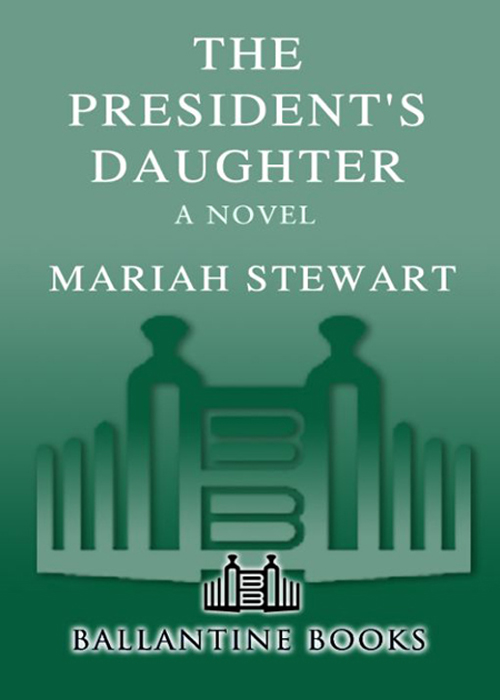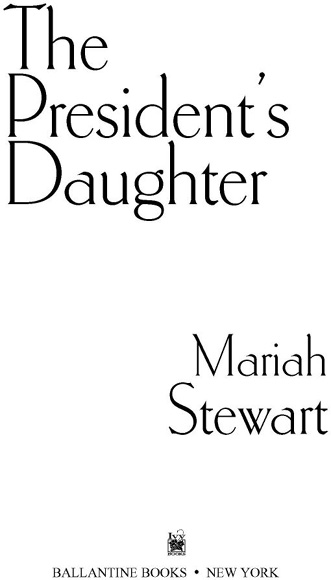The President's Daughter



Table of Contents
With love and thanks
to the incomparable Linda Marrow,
for having faith in me.
“Simon? You’re the only thing about this whole mess that I wouldn’t change.”
“Even though I brought this mess to your door?”
“You’re not responsible for the truth being what it is.”
He went to put the key in the front door.
And realized it was already open.
“Uh-oh,” he muttered.
He held out a hand to stop Dina from entering with him. Who knew who had been there, or why, or if they remained?
“Call nine-one-one on your cell phone. Tell them there’s been a break-in,” he said quietly.
“Are you serious? . . . Oh, my God, Simon, don’t go in there.”
He pushed the door aside far enough for them both to see inside, enough to know that someone had done far more than simply paid a visit. . . .

PROLOGUE
Washington, D.C.
December 14, 1971
2:03 A.M.
The woman stepped from the shadow of the stylish Art Deco apartment building, heels clicking on the walk as she strode with purpose toward the street. The light at this section of Connecticut Avenue was scant, despite it being a fine neighborhood. In fact, but for the lights at the intersection some hundred feet or more from the building, the lighting was scarce indeed.
At the end of the sidewalk, the woman paused, shivering. On this night, not even her fur coat and her cashmere gloves could keep out the cold.
The caller had said that a car would stop for her on the opposite side of the street at exactly 2:00 A.M. It was now a few minutes past. But she was certain the car would come. . . .
She continued toward the street. Such an odd time to be meeting someone, though of course she understood. There were good reasons for keeping their meeting a secret.
It was such a sensitive situation. And she totally understood the caller’s reluctance to be seen with her in public.
She doubted if even the caller had any idea of just how sensitive the situation really was.
She hunched her shoulders, as much against a sudden gust of wind as at the prospect of what she was about to face, desperately not wanting to go through with this meeting but knowing there was no way to avoid it. To try would appear cowardly. And how could she have refused? The caller had pleaded, had seemed so truly in need of speaking with her. . . .
How could she have said no?
The light changed and she stepped off the curb, a full half block from the light. Turning up her collar against the sharp wind, she began to cross to the designated spot on the opposite side of the street where she was to be picked up. She’d taken but four or five steps toward the centerline when she first saw the car approaching on her left, had barely noticed it at all when it had been loitering at the light, hunkered in the shadows with its lights off. She had assumed it to be unoccupied and therefore had paid it no mind.
Until it began to move.
Rapidly.
Accelerating as it passed through the intersection until it was upon her in less than the blink of an eye. There had been no time to move out of its path, no time even to scream.
She was dead before the car came to a stop barely fifteen feet from where she had fallen and idled for a long moment, as if in reflection, then shot backward defiantly to run over the lifeless body a second time.
Three cars would pass through the intersection before one would stop on the nearly deserted street to investigate the still bundle that only moments before had been a vibrant and beautiful woman.

CHAPTER ONE
Early February 2002
The money paid had been money well spent.
The figure paused in the doorway, backlit by the dim glow from the hall, eyes flickering from one still form to the other. The patients were scattered about the room, here and there in their chairs, each wrapped in his or her gauzy haze, somewhere between the memories of the past and the vagueness of today. The object of the visitor’s attention was in his usual place by the window that overlooked the wide expanse of lawn, where he could catch the changing of the seasons, year after year, for as many years as his advancing age and the whims of fate would permit.
And fate could be fickle, as everyone knew. Everything could change in a heartbeat. One moment of clarity, one memory recovered, and even the old man’s now-simple life could so easily become nothing more than someone else’s memory.
Crossing the room in a long-legged stride, the visitor took a seat in front of the old man’s chair.
“Hello, Miles.”
“Hello.” The old man nodded.
“How are you?”
“I’m fine,” was the automatic response.
“Did you have a good day?”
“Yes.” A nod of the head.
“What did you do today?”
“I took the train to Chicago.” The old man smiled. “With Dorothy.”
“Did you?”
“I did.” His smile broadened.
“And who is Dorothy?”
“Dorothy is . . .” The old man frowned. “Dorothy is . . . someone.”
His face folded into lines as his brows knit together, as he tried to recall. Tried so hard to bring it back. He’d just had it, if only for a second. Now it was gone.
“Dorothy was your sister,” he was reminded. “She died a long time ago.”
“I see,” the old man mumbled as he picked at a thread on his expensive sweater.
“Do you remember when Dorothy died?”
“No.” The old man shook his head. “But I remember when she was in Chicago.”
“What else do you remember, Miles?”
The old man looked out the window, as if perhaps something there might be familiar.
“Do you remember when you lived in Washington?”
“No.”
“Do you remember when you worked in the White House?”
“We lived in a white house, once. It was near New-port. There was a pond out back. Teddy drowned in the pond. He was very small. . . .” The old man’s gaze drifted back to the window, where the setting sun was beginning to send streaks of orange across a pale lavender sky.
“Yes, that was your little brother.” A touch to the old man’s face to get his attention. “I don’t mean that white house. I mean
the
White House. In Washington, D.C. Where the President lives. Do you remember when you worked there?”
The old man’s vague look was his only response.
“Do you remember Graham Hayward? President Hayward?” A studied pause. “Do you remember President Hayward? He was your friend. Your very best friend. You worked together in Washington.”
“Am I supposed to remember?” the old man mumbled. “I can’t remember.”
“It’s okay.” A forgiving pat on the old man’s hands reassured that all was well. “It’s all right. It’s okay that you can’t remember.” Another pause to reflect before adding, “Better for your sake, actually, that you don’t.”
The visitor sat with the old man for a few more moments, grateful that no memories had surfaced, that there would be nothing this day to be dealt with.
Finally, “Do you remember me?”
“No.” The old man searched the face that was now so close to his own. A sharp but fleeting image flashed from somewhere in the past but disappeared before he could name it.
“No,” he repeated warily, denying recognition even to himself.
His companion smiled for the first time since walking into the assisted living home, then stood and returned the chair to its place by the wall. In that brief time, the old man’s gaze had drifted back to the window and the world beyond.
“Good-bye, Miles. I’ll see you again soon.” The parting remarks went unnoticed.
A pause in the hall only long enough to press a folded envelope into the hands of the white-jacketed orderly who awaited.
“How did you find your . . . old friend?” the orderly asked.
“Same as always.”
The orderly nodded and served as an escort down the hall toward the now-darkened dayroom and the back door he’d unlocked earlier. In his pocket his fingers toyed with a corner of the envelope in which there was cash in an amount equivalent to his monthly salary. All for watching one old man and listening to his ramblings. The rich sure were different.
But why should he care, he shrugged, as long as that fat envelope came every month like clockwork? And it wasn’t as if he were doing anything illegal or immoral. Hell, he wasn’t hardly doing anything at all.
“Call me if there’s a change.” The figure paused in the open doorway.
“Of course.”
“
Any
change.” The emphasis was unnecessary. The orderly understood perfectly.
“Take it easy out there in the parking lot!” the orderly called through the double doors. “It’s still a little icy there. . . .”
“Thanks.” Hands tucked into pockets, the visitor headed out into the cold of the winter evening. Large, soft flakes were just beginning to fall, and they covered the brick walk and the parked cars like lacy leaves.
Humming, the figure walked through the pale shadows cast by the overhead lights to the car that waited at the back of the far lot, between a rusty Dumpster and a new red pickup truck.
The money had bought peace of mind. At least for tonight.
The old man’s memories were buried and locked away in a place where, hopefully, they would remain for the rest of his natural life.
Which was a very good thing. As long as they remained so, the secret was safe.
And Miles Kendall—who once long ago had moved among the powerful, among Kings and Princes and senators, who had kept the confidence, and the secrets, of a President—would live to see another day.
